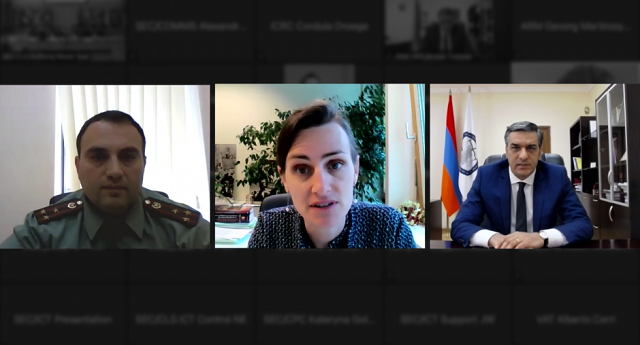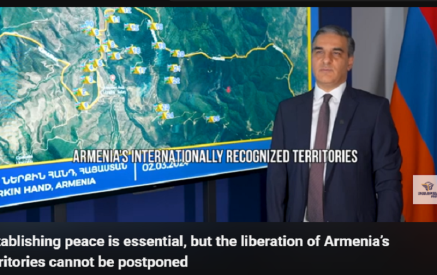VIENNA, 28 April 2021 — How states comply with international humanitarian law and the challenges they face in its implementation was the focus of the OSCE Forum for Security Co-operation (FSC) meeting held online today under the Armenian FSC Chairmanship.
The meeting was the first Security Dialogue organized by the Armenian FSC Chairmanship and featured three speakers who addressed the representatives of the OSCE’s 57 participating States. They explored how international humanitarian law protects people and alleviates human suffering and key challenges faced by states when applying the law. They also discussed the international community’s role in ensuring respect for the principles of international humanitarian law, as well as how to address non-compliance.
“When following the unfolding situation in the world, one cannot turn a blind eye to the fact that there is an unacceptable gap between what international humanitarian law prescribes and the practical reality,” said Colonel Gevorg Martirosyan, Head of the Human Rights and Integrity Building Centre of Armenia’s Ministry of Defense. Describing the human suffering characterizing the gap, he emphasized how States “should act in line with their legal and moral obligations” to fill the gap, highlighting principles and treaties, such as the Geneva Conventions and their protocols, that form the basis of international humanitarian law.
Cordula Droege, Legal Officer and Head of the Legal Division of the International Committee of the Red Cross, outlined concrete legal and practical measures States can implement to comply with international humanitarian law, and how more should be done to highlight the benefits of compliance. Referring to protective measures under international humanitarian law, she said they should apply to parties to a conflict “with no exceptions”.
Read also
“We need to keep stressing the point that those ‘on the other side’ — whether the military, non-State armed actors or even those accused of ‘terrorism’ — are human,” Droege said. “Codes of conduct such as that of the OSCE code on Politico-Military Aspects of Security, which strongly affirms the commitment to the principles of international humanitarian law, provide a framework which can guide the armed forces and civil authorities in their commitment and effort to respect and ensure respect for international humanitarian law.”
Arman Tatoyan, Human Rights Defender of Armenia, explained the connection between human rights and international humanitarian law, underscoring that human rights are universal for all people and their protection without a distinction made for political, jurisdictional or international status of the country or territory. He emphasized how the international community and national bodies can further support states’ compliance, highlighting the work of Armenia’s Office of the Human Rights Defender in recording, reporting and presenting on compliance with international humanitarian and human rights law in conflict-affected areas.
OSCE
Photo Caption: (l-r) Colonel Gevorg Martirosyan, Head of the Center for Human Rights and Integrity Building, Ministry of Defense of Armenia; Cordula Droege, Chief Legal Officer and Head of the Legal Division of the International Committee of the Red Cross; Arman Tatoyan, Human Rights Defender of the Republic of Armenia, speaking at the OSCE Forum for Security Co-operation, 28 April 2021. (OSCE)























































